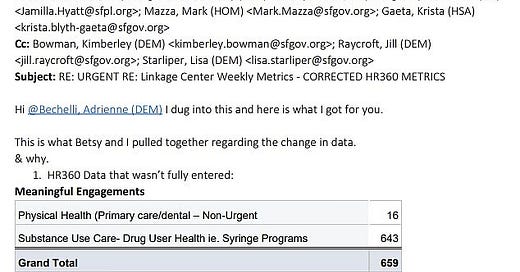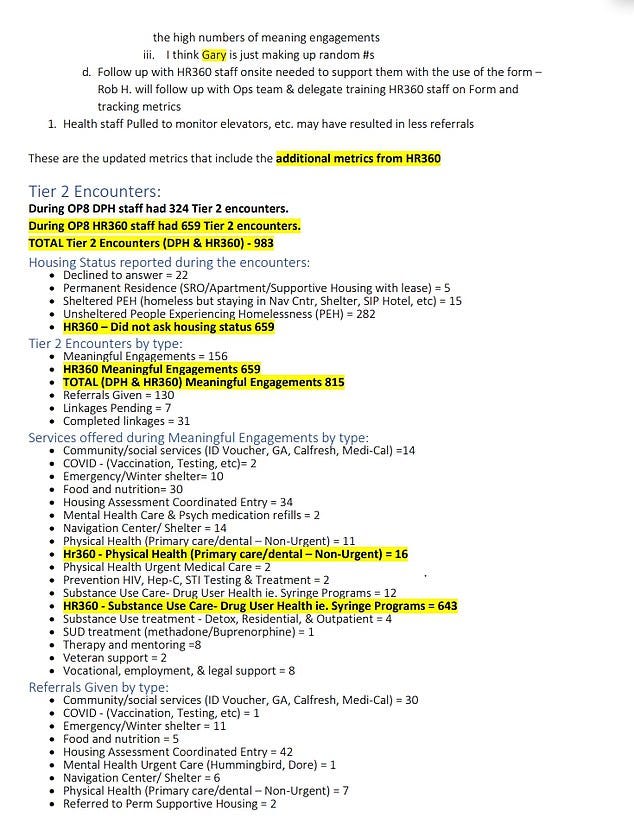Homelessness nonprofits are big business in San Francisco, and ties to City Hall run deep
From lying about the Linkage Center's success to appointing a nonprofit director to a board that decides funding, conflicts of interest abound
Full disclosure: I’ve been a critic of San Francisco’s Homeless Industrial Complex for many years. The amount of money flowing to “nonprofit partners” is outrageous — especially considering the condition the city is in. Let’s just say that if Apple CEO Tim Cook had similar results to show, he would have been kicked to the curb.
In a critical 2020 performance audit of the Department of Homelessness and Supportive Housing presented to the Board of Supervisors by the Budget and Legislative Analyst (the most recent on file), the department’s budget was $364 million — an 80 percent increase since its inception in 2016. And the results? The number of people without permanent housing grew by 30 percent from 2017 to 9,784 according to the last count in 2019.
As of that March 2020 audit, DHSH had contracts with 59 providers for 350 programs, including “Administration, Coordinated Entry, Housing, Outreach, and Temporary Shelter.” Total contract funding in FY 2019-20 was $240.6 million. They actually had money for those contracts left over: projected spending through June 30, 2020 was $182.9 million with a projected year-end balance of $26.5 million.
The competition for those millions is fierce, so it should come as no surprise that Gary McCoy, the vice president of public affairs and policy at HealthRIGHT 360, which runs the controversial Tenderloin Linkage Center (rumored to cost nearly $20 million), fudged the figures to make the program look more successful than it is.
Gina McDonald, who co-founded the advocacy group Mother's Against Drug Deaths (MADD) with Jacqui Berlinn, obtained emails through public records requests that revealed officials with the San Francisco Department of Public Health actively conspiring with HR360 executives to minimize McCoy’s fudging.
In a Feb. 8 email, Dr. Rob Hoffman, special project manager with the San Francisco Department of Public Health, wrote an email to colleagues stating, “I think Gary is just making up random numbers.” That was in reference to the 659 “meaningful engagements” recorded by staff for the week ending Feb. 7, 2022. Hoffman said he and a colleague had visited the linkage center over the same period, writing: “I observed the HR360 staff and did not see anything that can account for the high numbers of meaningful engagements.”
Alison Hawkes, Director of communications for SFDPH, personally modified an email in response to press queries about McDonald’s findings, which replaced words like 'mistake' and 'inaccurately' with a sprinkle of PR magic.
The original statement, written by Dr Matthew Goldman, read, “Part-way through the most recent reporting period, the TLC metrics team discovered that one of the CBOs was inaccurately recording data on engagements ...This mistake has since been resolved.” Hawkes reworked Goldman’s words to say, “one of providers at the site was defining engagements in a way inconsistent with other teams on the site.”
McDonald, who helped create MADD after her daughter became an addict in the Tenderloin neighborhood, compiled some damning figures: Between Jan. and March of 2022, just 18 of the 23,367 visitors to the site had been referred for medical or substance abuse treatment — equivalent to 0.7 percent of the people who visited the Linkage Center.
HR360 has millions of reasons to want to keep their position as one of City Hall’s favorite recipients of tax dollars — with revenue of $144,275,651, they spend $64,822,045 in salaries and wages, which includes over $2 million in executive compensation. Nine officers make between $234,000 and $312,000, including Medical Director Ako Jacintho, who makes nearly $253,000 annually — despite the fact his medical license is limited on practice due to probation which lasts through May 21, 2023. According to the Medical Board of California, Dr. Jacintho admitted to “gross negligence, repeated negligent acts, incompetence, failure to maintain adequate and accurate medical records, altered, modified, or created false medical records, and prescribed drugs without prior medical examination or indication of care and treatment.”

BOARD OF SUPERVISORS IGNORES CONFLICTS OF INTEREST
The ties between San Francisco politicians and homeless nonprofits have always run deep. For example, prior to his role as vice president of public affairs and policy for HR360, Gary McCoy worked for Nancy Pelosi, Scott Wiener and London Breed.
On April 4, the Board of Supervisors Rules Committee nominated Mary Kate Bacalao, Director of External Affairs and Policy at Compass Family Services, to sit on the Local Homeless Coordinating Board — a body that helps decide how to allocate HUD funds to homelessness organizations. There were six applicants and Bacalao’s is one of two that moved forward (the other is Health Commission president James Loyce, Jr. who will be succeeding himself). The Rules Committee (Rafael Mandelman, Connie Chan, and chair Aaron Peskin) voted unanimously to approve Bacalao and Loyce.
Through a public records request, I discovered that just days before her nomination, Bacalao visited supervisors during annual fundraising for the Homeless Emergency Services Providers Association (HESPA), where she requested $52 million on their behalf for homelessness-related programs like hers. Adding to the conflict, Compass gets about $1 million annually from the Continuum of Care, which is overseen by the Local Homeless Coordinating Board where Bacalao will now be a member.
In an email obtained through my records request to District 2 Supervisor Catherine Stefani’s office, Bacalao says, “Thank you for your time and thoughtfulness meeting with HESPA recently to discuss our budget priorities and requests. We appreciate your office’s leadership and engagement, and we would love to stay connected as the budget process evolves. I’m attaching an updated spreadsheet and narrative for our reference, and please feel free to direct any questions or comments our way.” Jennifer Friedenbach, director of the Coalition on Homelessness, and Joe Wilson, Executive Director of Hospitality House, are copied on the correspondence.
And yet tomorrow (Tues. April 11) the nominations will likely be confirmed without a peep from the Board of Supervisors regarding Bacalao’s multiple conflicts of interest. As for HR360’s lies about the success of the Linkage Center, the supervisors will likely remain silent on that, too. So it goes in the incestuous world of San Francisco politics and the city’s homeless industry — where billions are doled out, nonprofits are handsomely rewarded for accomplishing little, and the streets of the Tenderloin remain awash in drug addled misery.









It is apparent to anyone that has set foot in SF that $164M must be going anywhere but where it was allocated. Thanks for the breakdown, I think! Keep on digging..
I love this! The deep dive, not the mishandling of tax payers dollars. Great reporting!